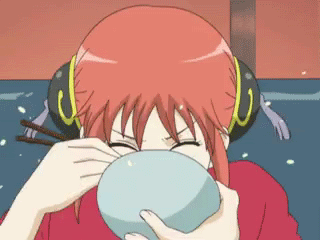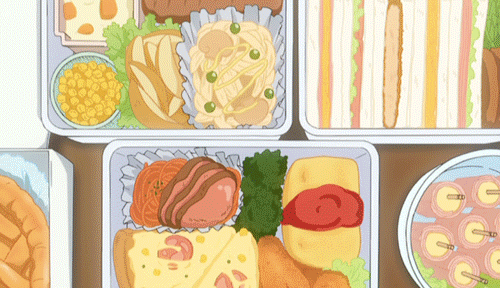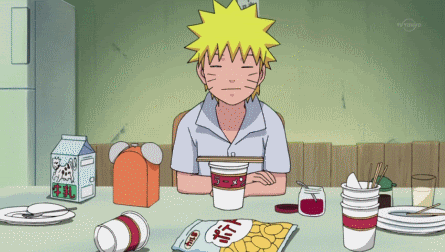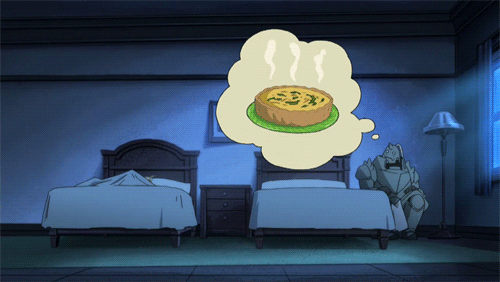Kaoko: 母ちゃん!お腹が すいた!今食べたいの! お昼ご飯はまだか? (Kaa-chan! Onaka ga suita wa! Gohan wa mada ka?) -> Mom! I'm hungry! Is the lunch ready yet?
Mother: うるさいわよ!(urusai wa yo!) -> Be quite (or, you are annoying)!
Uh, I guess the topic for today is food-meal-relating Japanese lesson!
Where do we start? OK, first! -> We'll start with... Itadakimasu! And... Gochisousama!
Itadakimasu! Gochisousama!
いただきます!(Itadakimasu!)
Yup, that's right. Japanese people with good manners do that every meal when they eat with their family or when they are invited to other people’s houses as well. I am sure you are familiar with this however. In anime, when the characters are about to eat, don't you always hear it (itadakimasu)? ^^
It is originally meant to show your appreciation to life, nature, a person who cooks a meal, serves the food or makes money to feed you, etc.
戴きます!(itadakimasu!): it literally means -> I humbly receive.
So, when said before eating. It becomes -> I humbly receive this food!
But these translations are also acceptable: I will eat now, let's eat, dig in, etc.
So, what do you say when you finish with the meal?
ごちそうさま!(gochisousama!)
The past tense form of this is ごちそうさまでした (gochisousama deshita).
The word gochisousama can also be written in kanji as either ご馳走様 or ご馳走さま. The word gochisou means -> 'feast' or 'a nice meal'.
E. g. 今日はご馳走です。(kyou wa gochisou desu.) -> Today is good meal.
And there you have it! ^^ Moving on~
It's very easy! First, let's list the Japanese words of; morning, noon, and night.
Kaoko: o_O
Jodie: So... how do you say 'I'm hungry' in Japanese?
There's two ways to say it!
Jodie: Ow, AWESOME! So, how do you say 'I wanna eat something'?
Jodie: この鮨を食べたいです。(kono sushi wo tabetai desu) -> I want to eat this sushi.
Post still under construction...
And there you have it! ^^ Moving on~
Breakfast! Lunch! Dinner! And... what?!
Jodie: How do you say them?It's very easy! First, let's list the Japanese words of; morning, noon, and night.
- 朝/あさ (asa -> morning)
- 昼/ひる (hiru -> noon; daytime)
- 夕/ゆう (yuu -> evening)
- 朝 (asa) + ご飯 (gohan) = 朝ご飯 (asa gohan) -> breakfast
- 昼 (hiru) + ご飯 (gohan) = 昼ご飯 (hiru gohan) -> lunch
- 夕 (yuu) + ご飯 (gohan) = 夕ご飯 (yuu gohan) -> dinner
See? A piece of cake!
There's also another way of saying them.
Add 食事 (shokuji), omit the 'ji' character and add them to the words listed above in On (Chinese way of reading) pronunciation.
There's also another way of saying them.
Add 食事 (shokuji), omit the 'ji' character and add them to the words listed above in On (Chinese way of reading) pronunciation.
- 朝 (chou) + 食 (shoku) = 朝食 (choushoku) = breakfast
- 昼 (chuu) + 食 (shoku) = 昼食 (chuushoku) = lunch
- 夕 (yuu) + 食 (shoku) = 夕食 (yuushoku) = dinner
Use the version you find easier.
Conversations
Kagura: ミチコさん、ミチコさん。わしの朝ご飯はまだかいの。(Michiko-san, Michiko-san. Washi no asa gohan wa mada kai no.) -> Michiko-san, Michiko-san. Is my breakfast ready yet?
Otohime: 何て力!(N-nante chikara!) -> What terrifying strength!
Kagura: ミチコさん、ミチコさん。わしの朝ご飯はまだかいの。(Michiko-san, Michiko-san. Washi no asa gohan wa mada kai no.) -> Michiko-san, Michiko-san. Is my breakfast ready yet?
Otohime: お婆さん、朝ご飯たらさき食べたでしょう!? (Obaa-san! Asa gohan tara saki tabeta deshou!?) -> Granny! But you just had breakfast a little while ago!
Kagura: あ、そうだったかい? それはすまなかったのー (Ah, sou datta kai? Sore wa sumanakatta no~) -> Oh, is that so? In that case, I am sorry~
Otohime: しめた!(Shimeta!) -> Now's my chance!
Kagura: ミチコさん、ミチコさん。わしの昼ご飯はまだかいの~。(Michiko-san, Michiko-san. Washi no hiru gohan wa mada kai no~?) -> Michiko-san, Michiko-san. Is my lunch ready yet?
Otohime: さき朝ご飯食べたばかり言ったでしょうが?!(Saki asa gohan tabeta bakari itta deshou ga?!) -> Didn't I just say you had breakfast a little while ago?
Kagura: そうかい。。。昼はまだかい。じゃあ、朝ご飯まだでじゅか? (Sou kai... hiru wa mada kai... jaa, asa gohan mada deju ka?) I see... it's not noon time yet... then, is [my] breakfast ready yet?
OMG! This is long xD I will continue it later ^^ This is just a fun method I made for remembering <3
My Stomach Is Empty! I Want Some Food To Fill It!
Jodie: My stomach is empty. Give me some food to fill it.Kaoko: o_O
Jodie: So... how do you say 'I'm hungry' in Japanese?
- お腹が空いた。(onaka ga suita) -> I am hungry.
- 腹がへった。(hara ga hetta) -> I am hungry.
- お腹空いた。(onaka suita) -> I am hungry.
- 腹へった。(hara hetta) -> I am hungry.
Note
お腹が空いた。(onaka ga suita): is a more common way for saying 'I am hungry'.
腹がへった。(hara ga hetta): is a casual way to say 'I am hungry'. Often used by men... if a woman says it, people would think that she doesn't speak how women should speak. I suggest you use the first one. ^^
Jodie: Ow, AWESOME! So, how do you say 'I wanna eat something'?
何が食べたい。(nani ga tabetai) -> I want to eat something. [add 'desu' to be polite]
Jodie: この鮨を食べたいです。(kono sushi wo tabetai desu) -> I want to eat this sushi.
Kaoko: その鮨じゃありません。エビフライです。(sono sushi ja arimasen. Ebi furai desu.) -> Those are not sushi. They are fried shrimps.
Kaoko: 母ちゃん!(Kaa-chan!) -> Mom!
Mom: 何よ! (Nani yo!) -> What?!
Kaoko: お腹が空いたわ!ご飯がいつ!? (Onaka ga suita wa! Gohan ga itsu!?) -> I’m hungry! When is food?
Mom: うるさい!(Urusai!) -> Shut up!
Kaoko: 早く!飢えてるよ!(Ha-ya-ku! Ueteru yo!) -> Hurry up! I’m starving!
Mom: 黙らなければ、黙らなければ、殺しに行こう (Damaranakereba… koroshi ni ikou) -> If you don’t stay quite, I’ll go there and kill you.
Kaoko: そんなわけないでしょう。だって、母ちゃんそんな事ほんとうに出来ないし。(Sonna wakenai deshou? Datte kaa-chan wa sonna koto dekinai shi!) -> There’s no way, is there. Because, you wouldn’t be able do it for real.
Mom: 黙ってくれないかしら? (Damatte kurenai kashira?) -> I wonder if you wouldn’t shut up?
Kaoko: は- はい (Ha-hai!) -> Y-yes, ma’am!
Everyone: じゃ、いただきます!(Ja, itadakimasu!) -> Well then, let’s eat!
Mom: これで? (Kore de?) -> This enough?
Kaoko: もっと、もっと。 (Motto, motto.) -> More, more~
Kaoko: ありがとう、それで十分だ。(Arigatou, sorede juubun da.) -> Thanks, that's enough.

Hizashi (Kaoko's older brother): 美味しいですね。(Oishii desu ne.) -> Delicious, isn't it?
Kaoko: 美味い!(Umai!) -> DELICIOUS!
Mom: それをよかった。(Sore wo yokatta) -> I'm glad to hear that. ^^
Hizashi: カオコ、このカレーは美味しいですよ。食べて見ませんかい? (Kaoko, kono karee wa oishii desu yo. Tabete mimasen kai?) -> Kaoko, this curry is delicious. Why don't you give it a try?
Kaoko: いい、食べて見よう。(Ii, tabete miyou.) -> Fine, I'll give it a try.
Hizashi: 辛いですね~ (Karai desu ne~) Spicy, isn't it~

Kaoko: 辛い、辛い!口の中ガ燃えてるわよ!水をお願いします!(Karai, karai! Kuchi no naka ga moeteru wa yo! Mizu wo onegaishimasu!) -> Spicy, SPICY! My mouth is on fire! Water please!
Here's more examples:
Word Check:
Things To Say At Meal
Kaoko: 母ちゃん!(Kaa-chan!) -> Mom!
Mom: 何よ! (Nani yo!) -> What?!
Kaoko: お腹が空いたわ!ご飯がいつ!? (Onaka ga suita wa! Gohan ga itsu!?) -> I’m hungry! When is food?
Mom: うるさい!(Urusai!) -> Shut up!
Kaoko: 早く!飢えてるよ!(Ha-ya-ku! Ueteru yo!) -> Hurry up! I’m starving!
Mom: 黙らなければ、黙らなければ、殺しに行こう (Damaranakereba… koroshi ni ikou) -> If you don’t stay quite, I’ll go there and kill you.
Kaoko: そんなわけないでしょう。だって、母ちゃんそんな事ほんとうに出来ないし。(Sonna wakenai deshou? Datte kaa-chan wa sonna koto dekinai shi!) -> There’s no way, is there. Because, you wouldn’t be able do it for real.
*Mom throws a knife at Kaoko. It went through and sliced Kaoko’s cheek a little*
Kaoko: は- はい (Ha-hai!) -> Y-yes, ma’am!
- Food is ready, every family members sits on each chair -
Everyone: じゃ、いただきます!(Ja, itadakimasu!) -> Well then, let’s eat!
Note
See? Just like I mentioned above. Japanese people with manners say this every time they are about to eat. ^^
*Kaoko finishes her bowl of rice and handed it to her mom for more*
Kaoko: お代り (Okawari!) -> another bowl!
Note
お代り (Okawari!): You say this whenever you want to have another helpings (when you finished with the thing you are eating/drinking and you want more). It means: Seconds (helping), another cup, another bowl, etc.
Mom: これで? (Kore de?) -> This enough?
Kaoko: もっと、もっと。 (Motto, motto.) -> More, more~
*Mom puts more rice into Kaoko's bowl*
Kaoko: ありがとう、それで十分だ。(Arigatou, sorede juubun da.) -> Thanks, that's enough.

Hizashi (Kaoko's older brother): 美味しいですね。(Oishii desu ne.) -> Delicious, isn't it?
Kaoko: 美味い!(Umai!) -> DELICIOUS!
Mom: それをよかった。(Sore wo yokatta) -> I'm glad to hear that. ^^
Hizashi: カオコ、このカレーは美味しいですよ。食べて見ませんかい? (Kaoko, kono karee wa oishii desu yo. Tabete mimasen kai?) -> Kaoko, this curry is delicious. Why don't you give it a try?
Kaoko: いい、食べて見よう。(Ii, tabete miyou.) -> Fine, I'll give it a try.
*Hizashi pours some curry into Kaoko's bowl. When she started to eat it...*
Hizashi: 辛いですね~ (Karai desu ne~) Spicy, isn't it~

Kaoko: 辛い、辛い!口の中ガ燃えてるわよ!水をお願いします!(Karai, karai! Kuchi no naka ga moeteru wa yo! Mizu wo onegaishimasu!) -> Spicy, SPICY! My mouth is on fire! Water please!
*Mom and Hizashi laughed*
Hizashi: ハハ、面白いですね。カオコの顔。(Haha, omoshiroi desu ne. Kaoko no kao.) -> Haha, Kaoko's face is amusing, isn't it?
Kaoko: 日差し!!(Hizashi!!) -> Hizashi!!- After everyone finishes eating -
Kaoko: 食った食った! (Kutta kutta!) -> I'm full, I'm full!
Note
食った、食った (kutta, kutta): Is a casual way of saying 'I am full'. The literal translation is: I ate, I ate.
The more formal way of saying 'I am full' in Japanese is... -> お腹がいっぱい (onaka ga ippai)
Hizashi: お腹がいっぱいです。ごちそうさま、お母さん。(Onaka ga ippai desu. Gochisousama, Okaa-san) I'm full. Thanks for the meal, mother.
The end~
Here's more examples:
- 野菜を食べなさい!(Yasai wo tabenasai!) -> Eat the vegetables!
- この弁当を作ったのは私です。食べてください。(kono bentou wo tsukutta no wa watashi desu. Tabete kudasai.) -> The one who made this bentou [Japanese lunch box] is me. Please eat it.
- その弁当を食べるな!毒があるぞ!(Sono bentou wo taberu na! Doku ga aru zo!) -> Don't eat that bentou! There's poison in it!
Word Check:
- 母ちゃん/かあちゃん (kaachan -> mom; mum)
- ご飯/ごはん (gohan -> rice (cooked); meal)
- うるさい (urusai -> noisy; loud; fussy; annoying; troublesome; tiresome; importunate; bossy)
- 今日/こんにち (kyou -> today; this day)
- 儂/わし (washi -> I; me (used by elderly))
- 先/さき (saki -> previous; prior; former; some time ago)
- 其れ/それ (sore -> it; that)
- すまない (sumanai -> sorry (phrase))
- 未だ/まだ (mada -> yet; still; more; besides)
- お婆さん/おばあさん (obaa-san -> grandmother; female senior-citizen)
- 言う/ゆう (iu -> to say)
- ばかり (bakari -> approximately; just; only; merely; nothing but)
- お腹/おなか (onaka -> stomach)
- 辛い/からい (karai -> hot (spicy); salty)
- 野菜/やさい (yasai -> vegetable)
- 毒/どく (doku -> poison; toxicant)
Auhor's Note: How was it? Do you like my lesson ^^? I have hard times going to other websites and confirming the things' right.
Some of the gifs I used were from here -> Anime Food Gifs
And I confirmed 'I am hungry' thing from here -> Yahoo Answers
There's still more that I wanted to add. But It'll take quite awhile (I will do it soon). If you have any suggestions what in your opinion should be added to this lesson, then don't hesitate to tell me via commenting on this post. I am all ears, and I would be really happy to consider your ideas ^^~
Post still under construction...






Haha I love it! Excellent! ^-^
ReplyDelete@Jojo: Thanks, Jojo! Your comment is much appreciated!
ReplyDeleteawsome very cool you are amazing i'm very happy thank you soooooooooooo much
ReplyDeletereally amazing
@Anonymous OMG! Your comment flattered me! I'm so honored. Thank you very much! It's too bad you are an anonymous ^^
ReplyDelete